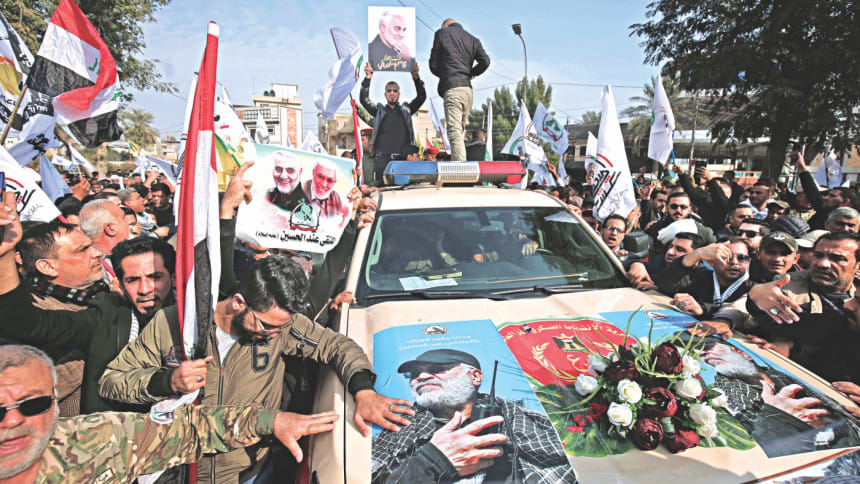Fury, tears, alarm

Tens of thousands of Iraqis, many chanting “Death to America”, yesterday mourned a top Iranian commander and others killed in a US drone attack that sparked fears of a regional proxy war between Washington and Tehran.
The killing of Iran’s Major General Qassem Soleimani on Friday was the most dramatic escalation yet in spiralling tensions between Iran and the United States, which pledged to send thousands more troops to the region.
Iraqi political leaders and clerics attended the mass ceremony to honour 62-year-old Soleimani and the other nine victim of the pre-dawn attack on Baghdad international airport.
US President Donald Trump said he had decided to “terminate” Iran’s military mastermind to prevent an “imminent” attack on US diplomats and troops.
“We took action last night to stop a war,” he insisted. “We did not take action to start a war.”
But a furious Iran has vowed revenge for the killing of Soleimani, the chief architect of its military operations across the Middle East.
“The response for a military action is a military action,” Iranian ambassador to the United Nations Majid Takht Ravanchi told CNN, calling the strike an “act of war”.
“By whom, by when, where? That is for the future to witness.”
In the hours after the strike, the US reached out to Iran, with which it has had no direct diplomatic ties for decades.
Iran’s Revolutionary Guards said Washington had used “diplomatic measures” to urge Tehran to respond “in proportion” to the strike -- a message Iran’s foreign minister Mohammad Javad Zarif slammed as “foolish”.
Zarif also spoke with his Chinese counterpart Wang Yi, who argued that “the dangerous US military operation violates the basic norms of international relations and will aggravate regional tensions and turbulence,” according to Chinese media.
The strike killed a total of five Iranian Guards and five members of Iraq’s Hashed al-Shaabi paramilitary network, whose members have close ties to Tehran.
Among the dead was the Hashed’s deputy Abu Mahdi al-Muhandis, who was a top adviser and personal friend to Soleimani.
Mass ceremonies started in Baghdad yesterday for the dead, with Iraq’s caretaker premier Adel Abdel Mahdi and top pro-Iran figures in large crowds accompanying the coffins.
They were first brought to a revered Shia shrine in northern Baghdad, where thousands of mourners chanted “Death to America!”
Dressed in black, they waved white Hashed flags and massive portraits of Iranian and Iraqi leaders, furiously calling for “revenge”.
The remains were then moved to the shrine city of Karbala and would ultimately end up in Najaf, where the Iraqis will be buried.
The Guards’ remains would be flown to Iran, which has declared three days of mourning and religious rituals.
As head of the Guards’ foreign operations arm, the Quds Force, Soleimani was a powerful figure domestically and oversaw Iran’s wide-ranging interventions in regional power struggles.
He had long been considered a lethal foe by Washington, with Trump saying he should have been killed “many years ago”.
Tehran has already named Soleimani’s deputy, Esmail Qaani, to replace him.
His first order of business was made clear Friday when Iran’s supreme leader Ayatollah Ali Khamenei promised “harsh revenge” for Soleimani’s death.
Abuhamzeh, the Revolutionary Guards commander in Kerman province, mentioned a series of possible targets for reprisals including the Gulf waterway through which about a third of the world’s shipborne oil is exported to global markets.
“The Strait of Hormuz is a vital point for the West and a large number of American destroyers and warships cross there,” Abuhamzeh was quoted as saying on Friday evening by the semi-official news agency Tasnim.
“Vital American targets in the region have long since been identified by Iran...Some 35 U.S. targets in the region as well as Tel Aviv are within our reach,” he said, referring to Israel’s largest city.
Iraqis worry the US strike could unleash a new wave of destabilisation for Iraq, which only two years ago announced it had defeated the Islamic State group.
Abdel Mahdi warned Friday it would “spark a devastating war in Iraq”, while President Barham Saleh pleaded for “voices of reason” to prevail.
Yesterday, the Hashed said a new strike had hit a convoy of their forces north of Baghdad, with Iraqi state media blaming the US.
But US-led coalition spokesman Myles Caggins denied involvement, telling AFP: “There was no American or coalition strike.”
Amid the tensions, the Pentagon said up to 3,500 additional US troops would be dispatched to Iraq’s neighbour Kuwait, to boost some 14,000 reinforcements already deployed to the region last year.
About 5,200 US troops are stationed across Iraq to help fight IS.
They have faced a spate of rocket attacks that the US has blamed on pro-Iran factions and which last month killed an American contractor.
As a result of the tensions, Nato said it was suspending its training activities in Iraq and a US defence official told AFP that American-led coalition forces would “limit” operations.

 For all latest news, follow The Daily Star's Google News channel.
For all latest news, follow The Daily Star's Google News channel. 








Comments